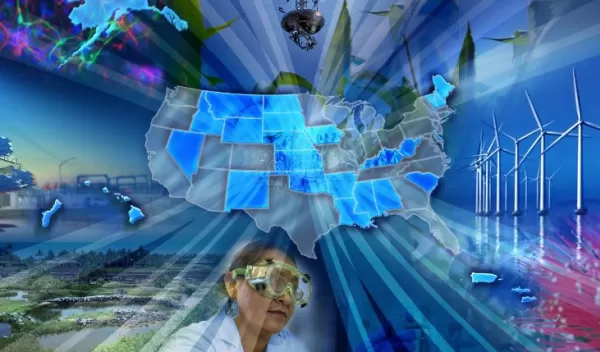
2022 EPSCoR RII Track-1 awardees to build more adaptive and resilient research infrastructure for next-generation technology development
A robust research infrastructure that can adapt and evolve with emerging methodologies and technologies is key to furthering scientific progress and fundamental to the progression of research and development. Investing in research infrastructure pays dividends in resilience, competitiveness and scientific breakthroughs.
The U.S. National Science Foundation announced five 2022 Established Program to Stimulate Competitive Research (EPSCoR) Research Infrastructure Improvement Program Track-1 (RII Track-1) awardees. The projects funded through the awards will support and further research partnerships with academic institutions, government agencies and industry to build out research infrastructure by supporting research-driven improvements to critical physical and cyber infrastructure.
The 2022 EPSCoR RII Track-1 awardees will work on initiatives that involve climate change, data science, fire science, low-temperature plasma science and engineering, and social equity and resilience. Each awardee will receive $20,000,000 over a five-year period to support their endeavor.
The 2022 EPSCoR RII Track-1 awardees are listed below.
- ALABAMA, Future Technologies and Enabling Plasma Processes: The team from The University of Alabama in Huntsville; Alabama Agricultural and Mechanical University; Alabama State University; Auburn University; Oakwood University; Tuskegee University; The University of Alabama at Birmingham; The University of Alabama; and University of South Alabama aims to develop new technologies using plasma -- the most abundant form of matter in the observable universe -- in hard and soft biomaterials, food safety and sterilization, and space weather prediction. This project will build plasma expertise, research and industrial capacity, as well as a highly trained and capable plasma science and engineering workforce, across Alabama.
- HAWAII, Change Hawai'i: Harnessing the Data Revolution for Island Resilience: The team from the University of Hawai'i and Chaminade University of Honolulu will enhance fundamental knowledge of climate impacts in Hawaii and develop actionable models to support a resilient Hawaii through a multidisciplinary research effort combining climate science and data science. Workforce development in data science will position Hawaii to confront climate change and support a state transition to a data-driven "smart" economy.
- KANSAS, Adaptive and Resilient Infrastructures driven by Social Equity, or ARISE: The team from the University of Kansas, Kansas State University, Wichita State University, Baker University, Donnelly College, and seven Kansas community colleges will leverage precipitation and population density gradients in Kansas, with changing climate patterns and frequent extreme weather events, to advance resilience across urban-rural interfaces. ARISE will build academic research capacity in Kansas for technology-enabled "smart and resilient" infrastructure research to transform rural and vulnerable communities that are typically underrepresented in smart cities research.
- NEVADA, Harnessing the Data Revolution for Fire Science: The team from the Nevada System of Higher Education; the University of Nevada, Reno; the University of Nevada, Las Vegas; and the Desert Research Institute intends to increase the capacity of Nevada for wildland fire research, education and workforce development and to demonstrate this increased capacity through technology-enhanced fire science in the regionally important sagebrush ecosystem.
- WYOMING, Anticipating the Climate-Water Transition and Cascading Challenges to Socio-Environmental Systems in America's Headwaters: The team from the University of Wyoming; Central Wyoming College; and Western EcoSystems Technology aims to establish innovative capacity in Wyoming to address the ecological and socioeconomic consequences of climate-driven changes to water supply. The project will significantly augment capabilities to predict and communicate scenarios related to long-term and severe drought. The central goal of the project is to enable communities and tribal collaborators to anticipate and prepare for significant and lasting changes in water availability.
Learn more about the ESPCoR RII-Track 1 program.
